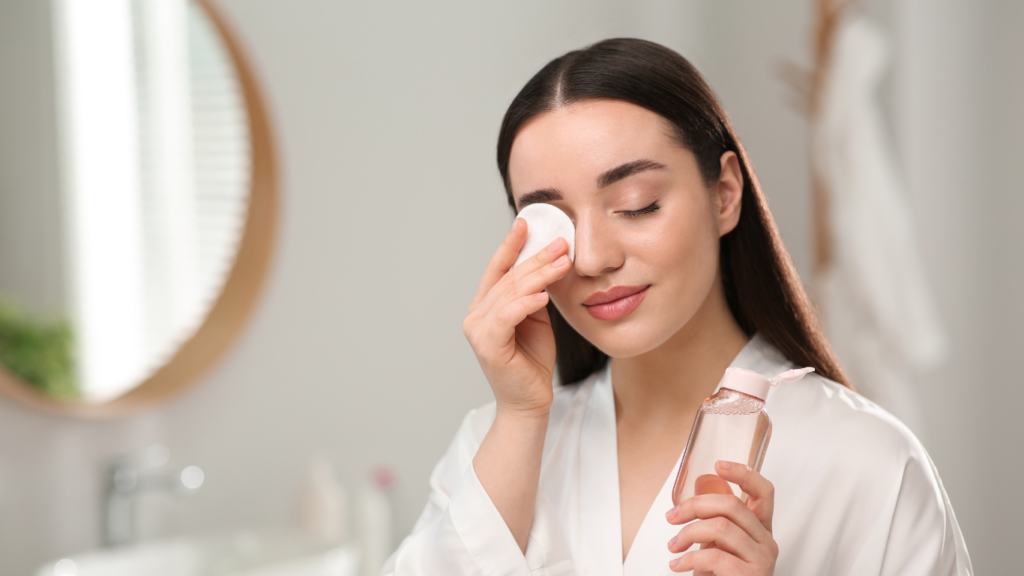
The rainy season means a lot of dampness and humidity in the air. This also makes it a season for infections, allergies, and breakouts or acne for oily skin. Skins look oily and greasy due to sweating. Some people’s skin becomes irritated or itchy during monsoon. Overall rainy weather is challenging for the skin and needs extra care.
Skincare on rainy days requires special attention due to increased humidity and the potential for pollutants and bacteria to stick to the skin. Here are some top tips for maintaining healthy skin during rainy weather:
- Gentle Cleansing: Rainy weather can bring pollutants and dirt that can clog pores. Use a gentle, sulfate-free, and soap-free cleanser to remove impurities without stripping your skin of its natural oils. Look for cleansers with soothing ingredients like chamomile or green tea extract. Please do not wash your face more than 2 to 3 times a day as it can have a drying effect on the skin. For sensitive skin, use fragrance-free cleansers. You may use a face wash with natural ingredients like neem, tea tree oil, and aloe vera during monsoon.
- Exfoliation: Increased humidity can cause dead skin cells to accumulate, leading to clogged pores and breakouts. Exfoliate 1-2 times weekly using a mild exfoliant scrub for best results. Exfoliation also improves blood circulation, promotes cell turnover, and clears pores. It also ensures that skin products get absorbed better.
- Toning: Toners help to balance the skin’s pH and remove any residual impurities. Choose a toner with hydrating and soothing properties, such as rose water or witch hazel. Avoid toners with high alcohol content as they can be too drying for the skin.
- Hydration: Despite the humidity, skin can still lose moisture, especially if you’re moving between air-conditioned indoors and damp outdoors. Use a lightweight moisturizer to keep your skin hydrated and look for ingredients like hyaluronic acid and glycerine which attract moisture to the skin. Regular moisturization keeps skin healthy. Stay hydrated by drinking an adequate quantity of water even if you don’t feel thirsty.
- Sunscreen: Do not get deceived by clouds in the sky. UV rays can penetrate through clouds, and rain can reflect these rays onto your skin. Apply a broad-spectrum sunscreen with at least SPF 30, even on cloudy and rainy days. Opt for a matt, non-oily, water-resistant formula to ensure it stays effective in wet conditions.
- Anti-Pollution Protection: Rain can bring down pollutants that can damage your skin. Incorporate an anti-pollution serum or cream into your routine. Look for antioxidants like vitamin C, vitamin E, or niacinamide in your serum to combat free radical damage. Vitamin C is particularly helpful in the monsoon season. It helps in reducing scars and blemishes apart from keeping the skin healthy and radiant.
- Clay masks: Good clay masks absorb oil effectively, unclog pores, and refresh your skin. You may prepare a mask at home using fuller earth (Multani mitti), sandalwood powder (Chandan), and turmeric (haldi) with rose water. Apply a thin layer and wash after drying.
- Lip Care: Lips can become chapped and dry in rainy weather. Use a hydrating lip balm with SPF to protect and moisturize your lips. For regular use, you may use tinted lip balms instead of lipsticks.
- Eye Care: The delicate skin around the eyes can be particularly sensitive to changes in weather. Use an eye cream for hydration and protection. Look for ingredients like peptides and caffeine to reduce puffiness and dark circles.
- Makeup tips: Go for no makeup or light makeup during rain. Heavy makeup can become cakey after mixing with rain and humidity, leading to clogged pores and breakouts. Use light, breathable makeup products, and consider using a tinted moisturizer or BB cream instead of a full-coverage foundation. Use oil-free or mattifying products if you have oily skin to control excess oil production and prevent shine.

It is also important to remove makeup properly. It prevents breakouts and keeps your skin clean and healthy. Keep blotting papers handy to absorb excess oil and keep your skin looking fresh throughout the day.
- Regular Facials: Professional treatments can help keep your skin clear and hydrated. Schedule regular facials to deep clean, exfoliate, and hydrate your skin. Look for facials that include steam and extraction to address clogged pores.
- Clothing and keeping skin dry: Wear light and breathable skin-friendly natural fabrics instead of synthetic fibers. If you get wet in the rain, take a shower in clean water when you get home. Dry your skin properly after a bath. Pat dry your skin instead of wiping dry as the former is less harsh for the skin.
- Take extra care of your Feet: Foot care is important in rain. Fungal infections and cracked heels are common problems in rain. Wear proper footwear, moisturize feet regularly, and keep them clean and dry. Wash your feet thoroughly after coming home on a rainy and do not walk barefoot at home. You may use antifungal powders if there are any signs of fungal infection and itchiness.
- Scalp care: Your scalp may also get itchy and dandruff during rains. Wash hair regularly. You may use an anti-dandruff shampoo if dandruff is a cause of concern.
- Eat a healthy diet: Rainy days are a good excuse for pakoras and samosas. Though these treats are definitely irresistible with a cup of hot chai, try to eat them in moderation. Oily foods are not good for the skin, especially in monsoon.
Apart from these, it’s important to follow personal hygiene during monsoon. Due to high humidity, bacteria, and fungus can multiply very fast causing infections. Wash your hands frequently in the monsoon. Opt for non-comedogenic (won’t clog pores) skincare products to prevent breakouts, especially if your skin tends to get oily in humid weather.
Pimples, itchiness, greasiness, dryness, or redness are the issues that you may normally face on rainy days. By following these simple tips given above, you can maintain healthy, glowing skin even on the rainiest of days.
